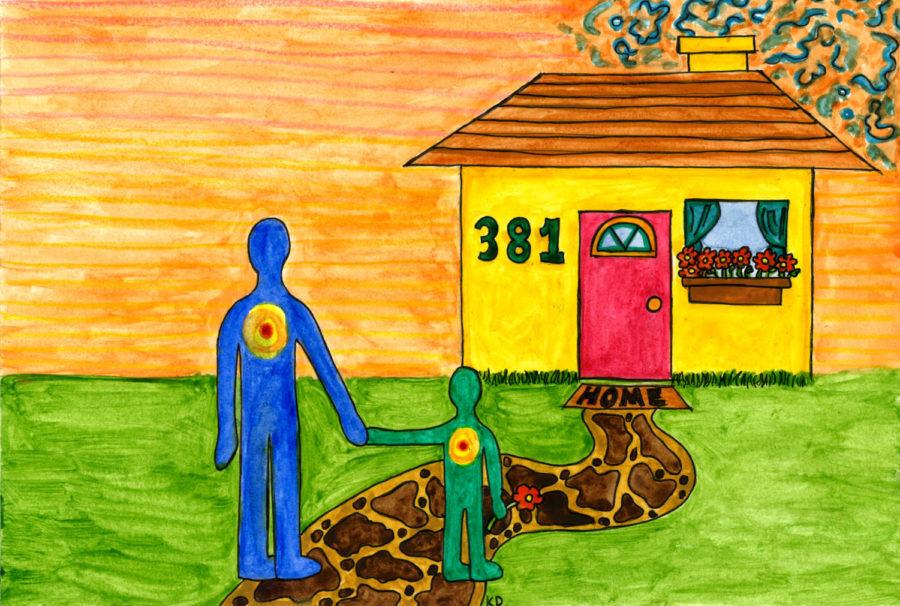Coming home for the holidays this year, I felt, for the first time, a sudden, overwhelming sense of gloom. Not in the typical meaning of the word, of course: the cold that has already begun to grip Chicago has more or less ignored Houston, Texas. But still, something about the winter gray skies in Hyde Park and its pattering, icy rain seemed to have seeped through and stayed with me. For a long time, I couldn’t quantify what it was, why the sunny blue here wasn't cheering me up, why I felt outsized in the rooms I’d grown up in, even around the habits and holiday traditions of my youth. Then I ran into a friend, who mentioned how much more mature she felt and how much she’d grown since we’d last seen each other in the fateful spring of our senior year. All at once, it became apparent to me that I too had grown—emotionally and personally—and this strange sadness was rooted in subconsciously realizing that this new version of me did not align entirely with the life I previously had at home.
It all makes sense. As we grow more and more rooted at UChicago, we drift further apart from our hometowns. But rather than a cause for grief, this distance between us and our past presents a unique opportunity: an opportunity not only for reinvention and independence, but also for reflection of the people and places that have shaped us.
I’m writing this in my childhood bedroom—a space full of things I’ve outgrown, shadows stretching from my past. But I know the outline of this doorway better than anything else. I know my mother’s footsteps, the sound of my father in the kitchen. I know that two doors down, the neighbors have a dog—a great big golden retriever—that they used to let us walk. There is a wooded shortcut from my house to my high school and another to the grocery store. These directions don’t change, even though I have.
My place in these rooms, with these people, feels suddenly fragile, as if I might disappear. And I realize, as my mother sets a plate before me, that I actually could. The rhythms of my school and home balance have vanished; my parents have painted the living room a different color. Nothing is stopping me from returning to college under a new nickname, a new haircut, a new personality—nothing except the roots I have put down here and the deep love I have for what I have always known. What remains, then, is reconciling the two: my commitment to my past, and the ever-present realization that I have changed.
Even as I recognize the elements of home that no longer fit me, the friends I’ve drifted apart from, the places of old routines I no longer have a reason to frequent, there is reassurance in this devotion. As I begin to relate these feelings of distance with my own personal growth, I can look back on old memories with fondness rather than longing, acceptance rather than pain. Hometowns hold so much of our lives, that the realization that we no longer fit into patterns so deeply rooted in our memories can be heartbreaking; but this separation can also provide the space we need to be able to engage more deeply with our memories, particularly the painful ones.
The relationships we foster in college can demonstrate weaknesses in the ones we had through childhood and high school, but they can also reveal how intensely strong some bonds are. With so many of my high school friends, the ability to pick up right where we left off acts as assurance that we were friends for reasons deeper than a shared chemistry class. The high school friendships that didn’t survive remind me that the people I meet in college don’t necessarily have to become permanent fixtures in my life to impact me. They teach me to be grateful rather than sad for the memories that we did share and the lessons I learned. Not everyone who crosses our path is destined to stay by our side, but I have begun to realize that this doesn’t mean that the love shared is any less true, or that their influence is less dim.
I am no longer the person I was then, but she is still inside me and will be forever, with her little hurts and joys and the knowledge of all the secret paths in her hometown intact. Space away from here, and a life back on campus, has allowed me a new perspective and the ability to filter my past and let go.
It becomes important to realize in adulthood that we will never be exactly who we were a year, a month, or even a week ago. Fundamentally, life, even the small bits, changes us irrevocably. With each moment, our goals, worries, fears, and dreams shift, and only unease originates from our attempts to pretend otherwise. We cannot fit into the past when we have moved forward, and it is a disservice to our present self to disregard growth for what is merely familiar. What we can do is continue to work with what we have now—this body, these desires —until that too changes and the cycle restarts. Let the past serve as the foundation to your new future, rather than as a weight. Let yourself grow, and marvel at how far you’ve come.
Annie Dhal is a second-year in the College.








